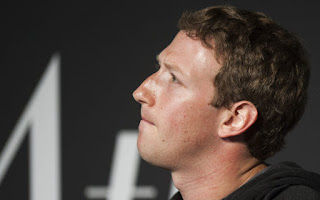Global stocks sank Wednesday after US President Donald Trump said he was not satisfied with talks that are aimed at averting a trade war with China. Equities were also dented by poor eurozone economic data, and as Trump cast doubt on a planned summit with North Korean leader Kim Jong Un. “Trump (is) continuing to drive uncertainty over global trade,” said analyst Joshua Mahony at trading firm IG. “European markets are following their Asian counterparts lower, as a pessimistic tone from Trump is compounded by downbeat economic data,” he added. Markets had surged Monday after US Treasury Secretary Steven Mnuchin and Chinese Vice Premier Liu He said they had agreed to pull back from imposing threatened tariffs on billions of dollars of goods, and continue talks on a variety of trade issues. However, Trump has declared that he was “not satisfied” with the status of the talks, fuelling worries that the world’s top two economies could still slug out an economically pain...
Mark Zuckerberg agreed to appear before a congressional panel next week, putting a spotlight on the Facebook chief executive and social networking giant pressured by a massive breach of private data and misinformation on the platform.
The House of Representatives’ Energy and Commerce Committee announced Wednesday what appeared to be the first congressional appearance by Zuckerberg since the scandal broke on the hijacking of data on tens of millions of users.
The April 11 hearing will “be an important opportunity to shed light on critical consumer data privacy issues and help all Americans better understand what happens to their personal information online,” said the committee’s Republican chairman Greg Walden and ranking Democrat Frank Pallone in a statement.
“We appreciate Mr. Zuckerberg’s willingness to testify before the committee, and we look forward to him answering our questions.”
Zuckerberg will likely face multiple congressional hearings as his social media giant battles a firestorm following revelations that the British consulting firm Cambridge Analytica obtained the data of 50 million Facebook users to try and manipulate US voters in the 2016 presidential election.
The Facebook co-founder has also been invited to appear before the Senate’s Judiciary Committee on April 10, alongside Google chief Sundar Pichai and Twitter head Jack Dorsey.
His participation is yet unconfirmed but Senator Dianne Feinstein told the San Francisco Chronicle that Zuckerberg had agreed to attend that hearing.
Zuckerberg, who has been making a series of media appearances after staying silent for several days on the breach, said earlier this week it would take “a few years” to fix the problems uncovered by the revelations on data misuse.
He told Vox.com that one of Facebook’s problems was that it was “idealistic,” focusing on the positive aspects of connecting people and that “we didn’t spend enough time investing in, or thinking through, some of the downside uses of the tools.”
The world’s biggest social network faces probes on both sides of the Atlantic over the misuse of data, which Facebook attributed to a breach of terms of service by an academic researcher linked to the consulting firm working for Donald Trump’s campaign.
Deleting Russian ‘trolls’
Late Tuesday, Facebook said it deleted dozens of accounts linked to a Russian-sponsored internet unit which has been accused of spreading propoganda and other divisive content in the United States and elsewhere.
Late Tuesday, Facebook said it deleted dozens of accounts linked to a Russian-sponsored internet unit which has been accused of spreading propoganda and other divisive content in the United States and elsewhere.
The social networking giant said it revoked the accounts of 70 Facebook and 65 Instagram accounts, and removed 138 Facebook pages controlled by the Russia-based Internet Research Agency (IRA).
The agency has been called a “troll farm” due to its deceptive post aimed at sowing discord and propagating misinformation.
The unit “has repeatedly used complex networks of inauthentic accounts to deceive and manipulate people who use Facebook, including before, during and after the 2016 US presidential elections,” said a statement Facebook chief security officer Alex Stamos.
Zuckerberg said in a separate statement on his Facebook page that the Russian group “has been using complex networks of fake accounts to deceive people.”
He added: “While we respect people and governments sharing political views on Facebook, we do not allow them to set up fake accounts to do this. When an organization does this repeatedly, we take down all of their pages, including ones that may not be fake themselves.”

Comments
Post a Comment